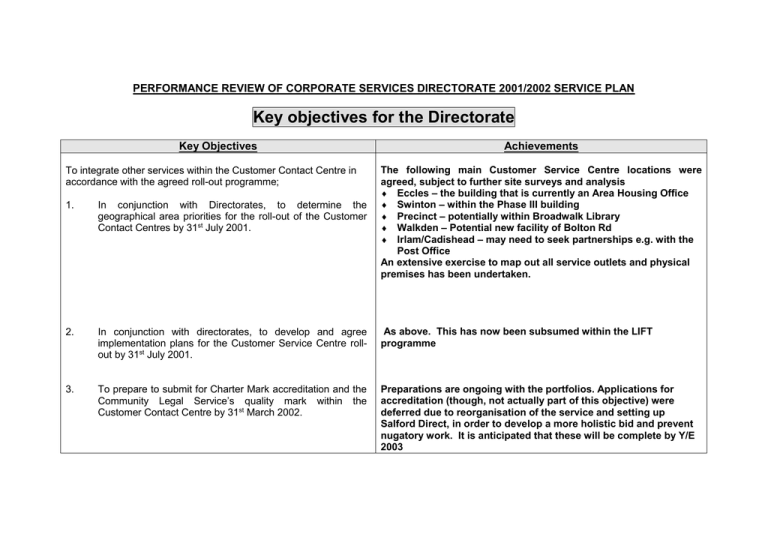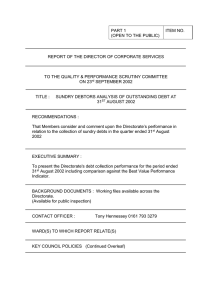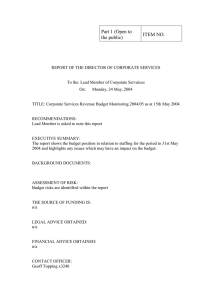Key objectives for the Directorate
advertisement

PERFORMANCE REVIEW OF CORPORATE SERVICES DIRECTORATE 2001/2002 SERVICE PLAN Key objectives for the Directorate Key Objectives To integrate other services within the Customer Contact Centre in accordance with the agreed roll-out programme; Achievements The following main Customer Service Centre locations were agreed, subject to further site surveys and analysis Eccles – the building that is currently an Area Housing Office Swinton – within the Phase III building Precinct – potentially within Broadwalk Library Walkden – Potential new facility of Bolton Rd Irlam/Cadishead – may need to seek partnerships e.g. with the Post Office An extensive exercise to map out all service outlets and physical premises has been undertaken. 1. In conjunction with Directorates, to determine the geographical area priorities for the roll-out of the Customer Contact Centres by 31st July 2001. 2. In conjunction with directorates, to develop and agree implementation plans for the Customer Service Centre rollout by 31st July 2001. As above. This has now been subsumed within the LIFT programme 3. To prepare to submit for Charter Mark accreditation and the Community Legal Service’s quality mark within the Customer Contact Centre by 31st March 2002. Preparations are ongoing with the portfolios. Applications for accreditation (though, not actually part of this objective) were deferred due to reorganisation of the service and setting up Salford Direct, in order to develop a more holistic bid and prevent nugatory work. It is anticipated that these will be complete by Y/E 2003 4. To carry out pilot studies in certain front-line service areas by 30th June, 2001, with a view to achieving levels 2 and 3 of the Council's Corporate Equality Standard for service delivery by 31st March, 2002 5. To facilitate the Council's Modernising Agenda and, particularly, the development of the Customer Contact Centre by: (a) (b) (c) Carrying out BPR Projects in accordance with the agreed roll-out programme Developing IT applications, including Customer Relationship Management, Council Information Repository, document handling and management of other Internet based solutions Developing a Council-wide Internet Strategy embodying E-Commerce The BEM group considered this objective specifically in the context of Race Equality but their deliberations were overtaken by the introduction of an integrated equalities policy by Personnel. The aim of the policy will be to achieve (As a minimum) Level 1 of the equality standard across the Council. BPR Programme: BPR Methodology (SPRINT) finalised Training Course devised and training undertaken to BV team BPR Project Work undertaken/ in hand: All of these targets to be completed by 31st March 2002. Births, Deaths Marriages completed and implemented Job Applications completed and implemented Schools Admissions completed Elections completed Economic development completed Elderly Services (ph 1) completed Land Charges (ph 1) completed Housing Services (analysis stage) in hand BV Projects (just commenced) Supporting BPR Web Site devised and implemented All Service Transactions specified for BV 157 target e-Government product Development: Core facilities developed and implemented including integration with initial legacy systems for Customer Relationship Management System (Citizen) Development of Agenda, Reports and Minutes Application (SOLAR) Development of Salford Partnership web site and Solar integration Development of Shareware Site for e-Government topics (Shareideas.Gov.UK) Web Site design and development (Including the ‘Lowry’ contract) Development of an E-Tendering application (PERMIS) PanEuropean Project Electronic Forms (Outlook and development of Mandoforms product) Best Value and Performance Management application developed Web content management tool in evaluation Sharepoint Portal server in implementation B. Governance 1. To have staff resources to assist in the delivery of the Community Strategy by 31st October 2001. The review of Democratic Services concluded that Committee Administration staff would continue to provide support to the various Community Committees and Political Executives. Support from other Directorates will be considered as part of the best value review of community engagement. 2. To submit the City Council’s proposals for modernisation in accordance with the Local Government Act 2000 to the Secretary of State by 30th June 2001. Achieved. 3. To prepare a Constitution Document in accordance with the abovementioned proposals and to implement the new system by 31st October 2001. Achieved and proposals approved by the Secretary of State. 4. To ensure transparency and accountability in the quantity and quality of all information available to the public by 31st March 2002. A number of different information channels exist and most recently the Council has published its annual Best Value and Performance Plan. With regard to public access to reports and decisions, there are proposals to expand the SOLAR system to enable citizens to access all formal Council business with the exception of those reports covered by the confidentiality provisions of the Local Government (Access to information) Act. C. Effective Services 1. To undertake a review of the strategic options for the future delivery of support services across the authority by 30th September 2001 This was a major exercise which reported to Scrutiny Committee in September, 2001. The report formed the basis for the development of both strategic and operational performance improvement plans (For all the Directorate’s services). These plans have effectively set the agenda for continuous improvement across the Directorate for the short, medium and long term. Most recently members will be aware of the decision to commission Manchester Business School to consider potential/desirability of strategic partnering. 2. To ensure the effective integration of the Community Legal and Advice Salford Partnership (C.L.A.S.P) across the City Council by 31st October 2001. C.L.A.S.P has been integrated across all council services by 31st October, 2001 and this target has therefore been achieved. However, Quality Mark approval is still awaited for some services and further work needs to take place to meet this objective. 3. To seek LEXCEL accreditation for Legal Services by 31st March, 2002. This target has not been achieved. The legal services team have however, committed themselves to achieving the target by March, 2003 and it appears in the current year (02/03) service plan. 4. To continue to develop the capacity to sell Internal Audit consultancy and systems to generate income during 2001/02. Income generated during the year amounted to £25,000. This was in accordance with expectations, but further opportunities for provision of consultancy services are still being investigated. 5. Legal Services to have engaged an external partner by 31st Achieved. Partnership with Messrs Cobbetts (Solicitors) now March 2002. established. Partnership operating well. D. Integrated and Efficient Back Office Systems 1. To implement a Benefits Verification Framework Plan for the City Council by 31st October 2001. 2. To further develop the Anti-Fraud and Security Strategy for the City Council by 31st March, 2002, to incorporate: (a) (b) (c) (d) The IT Security and Privacy Policy Disclosure of Information to Third Parties Exchange of Information between records held, and A complete audit of Data Protection Registers Verification framework implemented on 1st April, 2002. (Implementation was deferred in order to enable centralisation to bed in and to take advantage of additional government grants that were allocated in April 2002) (a) (b) (c) (d) Achieved. On going On going To be audited as part of this years audit plan 3. To develop processes during 2001/02 that will lead to Investors in People accreditation during 2002/03. BEM people group have started to identify the requirements to Directorate achievement of IIP. Need to re-examine as part of 2003/04 service plan. 4. To continue to undertake the Health and Safety Risk Assessments across the Directorate during the year. Exercise undertaken in the current financial year to identify health and safety risks across the Directorate. 5. Subject to funding, to determine the priorities for roll-out of a Teleworking Programme by 31st December 2001. Priorities determined and agreed. 6. To expand the uses of the SAP and other systems by 31st March, 2002, to include (subject to funding): (a) Property Management a) Property Management In conjunction with colleagues in Development Services a specification was prepared and submitted to SAP. The SAP property module was assessed based on a demonstration and site visit to Consignia. Development Services were not satisfied that SAP was the most appropriate system for their requirements and other options are being assessed. Development Services are to produce a report on the preferred option. (b) Document Imaging b) Document Imaging A project for the imaging of creditor invoices commenced in 2001/02. Options were evaluated and quotations invited. An order has been placed with Anite Public Sector for the provision of an imaging service to commence in August 2002. (c) Human Resource Management - training, recruitment c) HR Management The first phase of SAP recruitment went live in March 2002 along with the transfer of job applications to the call centre. Initial discussions have taken place with directorates regarding the potential use of the SAP for training management. The implementation of the training module has been delayed due to other demands on the e-merge team resource. It is intended to implement training in 2002/03. (d) Linkages with broad corporate policy objectives d) Corporate Policy Objectives The coding structures and reporting facilities in SAP are available to identify the costs of Council objectives e.g. crime. Alternative coding structures can be utilised for costing other objectives providing the appropriate cost centres can be identified and costs are charged on a consistent basis. (e) Post-implementation review of SAP following the completion of phases 1,2 and 3. e) Post Implementation Review of SAP Working groups were established to review the implementation of Payroll, Creditors, Debtors and Purchasing. Most issues identified at these meetings have been addressed by the FSG and e-merge teams. There are other issues such as streamlining associated processes that will be addressed as part of a longer term development plan. A Best Value Review of FSG/SAP is to commence in September 2002. 7. To reduce the level of sundry debts older than 30 days by 5% by 31st March 2002. Achieved. The value of debts older than 30 days reduced by 5.7% in 2001/02 to £8.3m. 8. To undertake further energy audit work to achieve additional cost savings of £500,000 in total by 31st March 2002. Achieved. £625,000 savings identified. 9. To implement the recommendations with regard to the centralisation of the Council Tax and Benefits Services arising from the review undertaken in 1999. Achieved. 10. To develop and implement a plan to deliver savings of £250,000 arising from the centralisation of the purchasing function by 31st March 2002 11. To improve the Directorate's performance in relation to the 5 year targets contained within the Best Value Performance Plan, with particular regard to the processing of local land The savings target for 2001/02 of £250,000 was included in the budget plan for the year and has been achieved. Performance in both of these areas has improved. The land Charges BVPI was in the top quartile with 99.12% of searches being processed within 10 days or less. With the introduction of charge searches and the Council Tax and Benefits Services. the Benefits Verification Framework turnaround times for Council tax and benefits were fluctuating. The current year service plan identifies that improvements are now starting to materialise. E. ICT Strategy Social Inclusion 1. In conjunction with partners, to launch the Salford Virtual Community Programme by 30th September 2001. Launched July, 2001 2. To have a minimum of 30 local community groups participating on the Website by 31st March 2002. Salford Speaks (www.salford.gov.uk) was launched March 2001 and easy to use web site design tool (www.colsal.org.uk) now up and running with approximately 30 groups in various stages of developing a web site. 3. To have developed and agreed an outline community ICT Strategy by 31st March 2001. A community ICT strategy in the form of the ‘ICT in the Community’ project was launched in July 2001 funding primarily through SRB5 and ERDF together with match funding from partners organisations including PCT and local colleges. 4. In conjunction with the Education and Leisure Directorate with their ICT strategy and specifically, to project manage the Peoples Network Programme to ensure implementation within 17 libraries by 31st March 2002. This is a large and ambitious project which is currently being implemented, with all schools and libraries to be connected to the internet. This target specifically relates to libraries and is expected to be concluded by December, 2002. 5. To facilitate the Community Grid for Learning Programme, and in conjunction with partners, to ensure three community based facilities are established by 30th September 2001. Subsumed within other programmes, including Community Grid for Learning and being implemented through successful bids e.g. SCIP/SRB ICT in the Community. 6. In conjunction with partners, to facilitate community ICT Achieved. capacity building by holding 500 one-to-one sessions (500 hours), 100 outreach sessions (200 hours), and a further 600 hours of training delivered through the mobile facility by 31st March, 2002. 580 one to one sessions Achieved. 6,000 hours of outreach training – through the success of the ‘ICT in the Community project’ General 7. To develop effective mechanisms to bid for external funding in support of E-Government, Social Inclusion and ICT Programmes by 31st May, 2001. 8. To develop a marketing plan for effective dissemination of the Information Society Programme by 31st December 2001. 9. To facilitate and assist all City Council Directorates to meet Best Value E-Government targets by 31st March 2002 and 2005. Successfully attracted Pathfinder funding (£870k); European funding for e-tendering (£70k); ECDL training to support the Peoples Network (£50k). Successful funding bids to develop the ‘ICT in the Community Project’ - £100,000 SRB (July 2001-March 2003) and £213,000 ERDF (March 2002-March 2004). People’s Network funding of £486,000 to develop ICT facilities in public libraries. Marketing plan subsumed within “Pathfinder” activities where national recognition was gained as a result of the work we have undertaken. Hosted seminars and mentoring sessions. Also developed the Centre of Excellence and further developed the Authority’s web presence. This is an on-going objective, which has already achieved considerable success. Examples of success in this area include : Establishment of the Customer Contact Centre; Establishment of Salford Direct, Advance and ITNet ; Provision of Change Management and BPR skills and capacity; PRINCE project Management Office; CRM; SOLAR; Design, procurement and initial implementation of Broadband facilities; ECDL test centre statusover 250 modules passed by officers; Development of Shareware site and Office automation and Document Management roll-out. 10. To achieve “Pathfinder” status by June 2001 and to deliver in accordance with the detailed project programme and timescales. Achieved. DTLR Pathfinder requirements also fully complied with.



